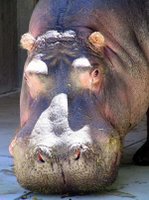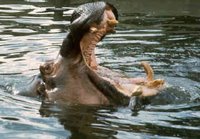 hippopotamus is now a member of the Endangered Species list. Here's the Associated Press report:
hippopotamus is now a member of the Endangered Species list. Here's the Associated Press report:Polar bears, hippos, freshwater fish threatened with extinction, conservation group says
May 1, 2006
GENEVA (AP):
Polar bears, hippos and freshwater fish are among more than 16,000 species of animal, bird, fish and plant threatened with global extinction, the World Conservation Union said Tuesday.
According to the Swiss-based conservation group, known by its acronym IUCN, the number of species classified as in serious danger of extinction rose from about 15,500 in its previous Red List report, published in 2004.
These include one in three amphibians, a quarter of the world's coniferous trees and mammals and one in eight birds, according to a preview of the 2006 Red List. The full report is published later this week.
"Biodiversity loss is increasing, not slowing down," said IUCN Director General Achim Steiner.
"The implications of this trend for the productivity and resilience
 of ecosystems and the lives and livelihoods of billions of people who depend on them are far-reaching."
of ecosystems and the lives and livelihoods of billions of people who depend on them are far-reaching."The Red List classifies about 40,000 different species according to their risk of extinction and provides a searchable online database of the results. The total number of species on the planet is unknown, with 15 million being the most widely accepted estimate. Up to 1.8 million are known today.
People are the main reason for most species' decline, mainly through habitat destruction, according to IUCN.
Polar bears are threatened by global warming and melting ice caps, because they are conditioned for the icy environment and depend on Arctic ice floes for hunting seas. They are predicted to suffer a 30 percent population decline in the next 45 years.

The hippopotamus population in war-ravaged Congo, meanwhile, has plummeted by 95 percent, mainly due to unregulated hunting for meat and ivory in their teeth.
"Regional conflicts and political instability in some African countries have created hardship for many of the region's inhabitants and the impact on wildlife has been equally devastating," said IUCN Chief Scientist Jeffrey McNeely.
Freshwater fish have suffered some of the most dramatic population declines because of human activities that damage their habitat, like forest clearance, pollution and water extraction. Around the Mediterranean, more than half of the 252 endemic species are threatened with extinction.
Seven species, including two relatives of carp, are already extinct, IUCN said.
"Reversing this trend is possible, as numerous conservation success stories have proven," Steiner said. "Biodiversity cannot be saved by environmentalists alone – it must become the responsibility of everyone with the power and resources to act."
Amen to that! The hippopotamus is endangered!?!?! What the hell are we doing to our world when hippos are endangered? I'll be posting more info on how you can help the Hippopotamus population soon! However, on a brighter note, here's a fun little story from earlier this year:
The Tortoise & The Hippo

A baby hippopotamus, swept into the Indian Ocean by the Tsunami, is finally coming out of his shell thanks to the love of a 120-year-old tortoise.
Owen, a 300kg, one-year-old hippo, was swept down the Sabaki River , into the ocean and then back to shore when the giant waves struck the Kenyan coast. The dehydrated hippo was found by wildlife rangers and taken to the Haller Park animal facility in the port city of Mombasa .
Pining for his lost mother, Owen quickly befriended a giant male Aldabran tortoise named Mzee - Swahili for "old man".
"When we released Owen into the enclosure, he lumbered to the tortoise which has a dark grey colour similar to grown up hippos," Sabine Baer, rehabilitation and ecosystems manager at the park, told Reuters on Thursday. Haller Park ecologist Paula Kahumbu said the pair were now inseparable.

After it was swept and lost its mother, the hippo was traumatised. It had to look for something to be a surrogate mother. Fortunately, it landed on the tortoise and established a strong bond. They swim, eat and sleep together, the ecologist added. The hippo follows the tortoise exactly the way it follows its mother. If somebody approaches the tortoise, the hippo becomes aggressive, as if protecting its biological mother," Kahumbu added.
"The hippo was left at a very tender age. Hippos are social animals that like to stay with their mothers for four years."She said the hippo's chances of survival in another herd were very slim, predicting that a dominant male would have killed him.Officials are hopeful Owen will befriend a female hippo called Cleo, also a resident at the park.

No comments:
Post a Comment